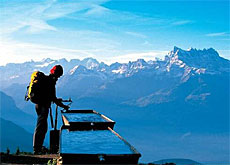Swiss to steer alpine countries group

Switzerland is synonymous with the Alps and this year it plays a central role for the entire alpine region, assuming the presidency of the Alpine Convention.
In Brdo pri Kranju, Slovenia, environment ministers from the convention’s signatory countries have been taking part in a decision-making conference where on Wednesday the presidency was handed over from Slovenia to Switzerland.
Swiss Environment Minister Doris Leuthard could not make it to Brdo because of diary commitments but she will have until the end of 2012 to make good use of her role as president of the convention.
The convention is an international treaty on sustainable development signed by eight alpine countries and the European Union. It covers 190,000 square kilometres of alpine territory and aims for international cooperation on spatial planning, soil conservation, farming, forestry, tourism, transport and energy.
Switzerland signed the framework of the convention when it was drawn up 20 years ago, but there has been political resistance to being tied to its protocols with the result that none has yet been ratified by Switzerland.
From the beginning, according to Silvia Jost of the Federal Spatial Development Office, part of the Swiss delegation in Slovenia, Switzerland has worked “intensively and with great initiative” on the convention and its protocols of implementation.
However, the fact that none of the convention’s protocols has been adopted by Switzerland is difficult to ignore. The House of Representatives recently rejected the protocols in a September 2010 vote without even discussing the issue, a move which stung campaigners and mystified other member states.
“Disgusted and appalled”
Dominic Siegrist, president of the International Commission for the Protection of the Alps (Cipra), told swissinfo.ch at the time he was “disgusted and appalled” at the decision and he blamed it on the “anti-ecological and anti-internationalist” make-up of the House of Representatives.
At its annual meeting in Semmering in Austria last October, the commission adopted a resolution which noted Switzerland’s refusal to ratify protocols of the convention, describing the Swiss vote as “incomprehensible”.
Jost told swissinfo.ch that the other member states honored Switzerland’s efforts. “They know the situation of Switzerland and are aware that Switzerland has taken on [the convention’s] conditions in its national laws.”
Christian Lüthi, director of Cipra Switzerland, echoed Jost’s point that Switzerland is already effectively adhering to the protocols.
“There is nothing standing in the way of the implementation of the convention – all the contents of the convention framework are already included in national law so it’s not a problem for operational work,” Lüthi told swissinfo.ch.
Still, he said it would be better if Switzerland ratified at least one of the protocols, if only for the sake of appearance. “It is always good to be able to lead by example, better for the image of the country.”
Public collaboration
Looking ahead, Jost said the presidency was a chance for Switzerland to show that its cooperation with the Alpine Convention had real substance. “And that we have a diverse wealth of experience that will allow the country to play a formative role in the development of the alpine space.”
Switzerland wants to foster collaboration in the alpine region and see it further strengthened under its presidency.
“Within the convention lots of knowledge and joint documents are being exchanged between different working groups and platforms, but this often happens without being noticed. Therefore we want to improve the public collaboration of the different players.”
Switzerland also intends to be an advocate for the alpine states within the European Union, supporting their efforts to raise awareness of their concerns by pointing out the functions and strengths of the Alpine space.
As a water reservoir, producer of renewable energy, transit axis and tourism region, the Alps are strategically important for Europe, Jost said.
To attain the two objectives, Switzerland has prepared “a vast programme to launch new ideas and activities”. One of the programme highlights will be an international conference on sustainable development in mountain regions which will take place in Lucerne in October.
For its part, Cipra wants to see concrete projects set up, and the organisation is calling for the creation of a fund to finance and improve communication.
The Alpine Convention is an agreement between various countries for the protection and sustainable development of the Alpine Region.
It was signed in November 1991. Included is the European Union and eight states: Switzerland, Liechtenstein. Monaco, Germany, Italy, Austria, France and Slovenia.
Switzerland signed the framework convention but has still not ratified the ten protocols. These require the signatory countries to adopt measures to realise the goals. The issue has dragged on for a decade without being resolved.
At the end of September 2010, the House of Representatives voted against the ratification of the protocols, refusing to debate the topic beforehand.
The convention covers a cross-border area of 190,000 square kilometres comprising 43 regions and 5,800 communes with a population of 13 million.
Cipra is a non-governmental, non-profit umbrella organisation that has been committed to the protection and sustainable development of the Alps since 1952.
Its international executive office is located in Liechtenstein, it has representatives in seven Alpine states and around 100 member organisations and institutions.
Cipra’s goal is to play a pioneering role in contributing to solving current problems and challenges aimed at bringing about a sustainable and ecological future for the Alpine region.
Cipra Switzerland is an umbrella organisation made up of 14 organisations, such as the Swiss Alpine Club, Mountain Wilderness, Pro Natura and WWF.

In compliance with the JTI standards
More: SWI swissinfo.ch certified by the Journalism Trust Initiative












You can find an overview of ongoing debates with our journalists here . Please join us!
If you want to start a conversation about a topic raised in this article or want to report factual errors, email us at english@swissinfo.ch.